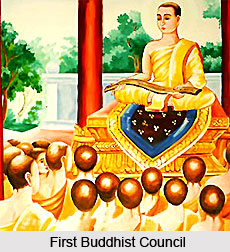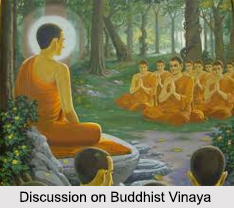 As per the late commentarial accounts, King Ajatashatru had patronized the First Buddhist council. It was summoned in the year following the Buddha`s Parinirvana, which would be 499/8 BCE according to Theravada tradition (also, at various earlier dates according to various Mahayana traditions, and various later dates according to various Western approximations). Traditional lore holds that the Council was held in a hall constructed by Ajatashatru outside the Sattaparnaguha Cave (Pali: Sattapanniguha) in Rajgir, three months after Buddha had attained salvation. Detailed accounts of this historic meeting can be obtained in the Khandhaka sections of the canonical Vinayas.
As per the late commentarial accounts, King Ajatashatru had patronized the First Buddhist council. It was summoned in the year following the Buddha`s Parinirvana, which would be 499/8 BCE according to Theravada tradition (also, at various earlier dates according to various Mahayana traditions, and various later dates according to various Western approximations). Traditional lore holds that the Council was held in a hall constructed by Ajatashatru outside the Sattaparnaguha Cave (Pali: Sattapanniguha) in Rajgir, three months after Buddha had attained salvation. Detailed accounts of this historic meeting can be obtained in the Khandhaka sections of the canonical Vinayas.
Records of leaders in First Buddhist Council
According to this record, the incident which motivated the Elder Mahakassapa (also known as Kasyapa, was a brahman of Magadha, who became one of the principal disciples of Sakyamuni Buddha) to call this meeting was his hearing a derogatory remark about the stern rule of life for monks. This is what allegedly happened. The monk Subhadda, who had consecrated late in life, upon hearing that the Buddha has left for the heavenly abode, voiced his antipathy at having to abide by all the rules for monks laid down by the Buddha. Many monks deplored the passing of the Buddha and were aggrieved profoundly.
 Mahakassapa was alarmed by Subhadda`s denigrated remark and dreaded that the Dhamma (it carries two meanings: the teachings of Buddha which lead to enlightenment, and, the constituent factors of the experienced world) and the Vinaya (a word in Pali as well as in Sanskrit, this is the regulatory framework for Buddhist monastic community, or sangha, based in the canonical texts called Vinaya Pitaka) might be debased and not survive intact if other monks were to behave like Subhadda and render the Dhamma and the Vinaya rules as they wished. To avoid this he decided that the Dhamma must be preserved and protected. To this end after gaining the Sangha`s approval, he called to council five hundred Arahants. Ananda was to be included in this, provided he attained Arahanthood by the time the council gathered together.
Mahakassapa was alarmed by Subhadda`s denigrated remark and dreaded that the Dhamma (it carries two meanings: the teachings of Buddha which lead to enlightenment, and, the constituent factors of the experienced world) and the Vinaya (a word in Pali as well as in Sanskrit, this is the regulatory framework for Buddhist monastic community, or sangha, based in the canonical texts called Vinaya Pitaka) might be debased and not survive intact if other monks were to behave like Subhadda and render the Dhamma and the Vinaya rules as they wished. To avoid this he decided that the Dhamma must be preserved and protected. To this end after gaining the Sangha`s approval, he called to council five hundred Arahants. Ananda was to be included in this, provided he attained Arahanthood by the time the council gathered together.
Functionality of the Buddha Council
The Elder Mahakassapa presided with the five-hundred Arahant monks met in council during the rainy season. The first thing Mahakassapa did was to question the foremost expert on the Vinaya of the day, August Upali on details of the monastic rule. This monk was well qualified for the task since Buddha had taught him the whole of the Vinaya himself. The Elder Mahakassapa asked him distinctly about the ruling on the first offense parajika, concerning the subject, the occasion, the individual introduced, the proclamation, the repetition of the proclamation, the offense and the case of non-offense. Upali gave well-versed and adequate answers and his remarks met with the unanimous commendation of the presiding Sangha. Thus, the Vinaya was formally approved.
The Elder Mahakassapa then focussed his attention on Ananda in virtue of his respectable expertise in all matters linked with the Dhamma. Mirthfully, the night before the Council was to meet, Ananda had achieved Arahantship and joined the Council. The Elder Mahakassapa, thus, was able to question him for a prolonged period with complete trust about the Dhamma with particular reference to the Buddha`s sermons. This interrogation on the Dhamma attempted to assert the place where all the preachings were first preached and the person to whom they had been addressed.
Ananda assisted by his word-perfect memory was able to answer precisely and so the Discourses met with the unanimous commendation of the Sangha. The First Council also gave its official seal of approval for the closure of the chapter on the minor and lesser rules, and approval for their observance. It took the monks seven months to enumerate the whole of the Vinaya and the Dhamma and those monks amply empowered with good memories retained all that had been recited. This historic first Buddhist council came to be known as the Pancasatika because five-hundred fully enlightened Arahants had taken part in it.




















